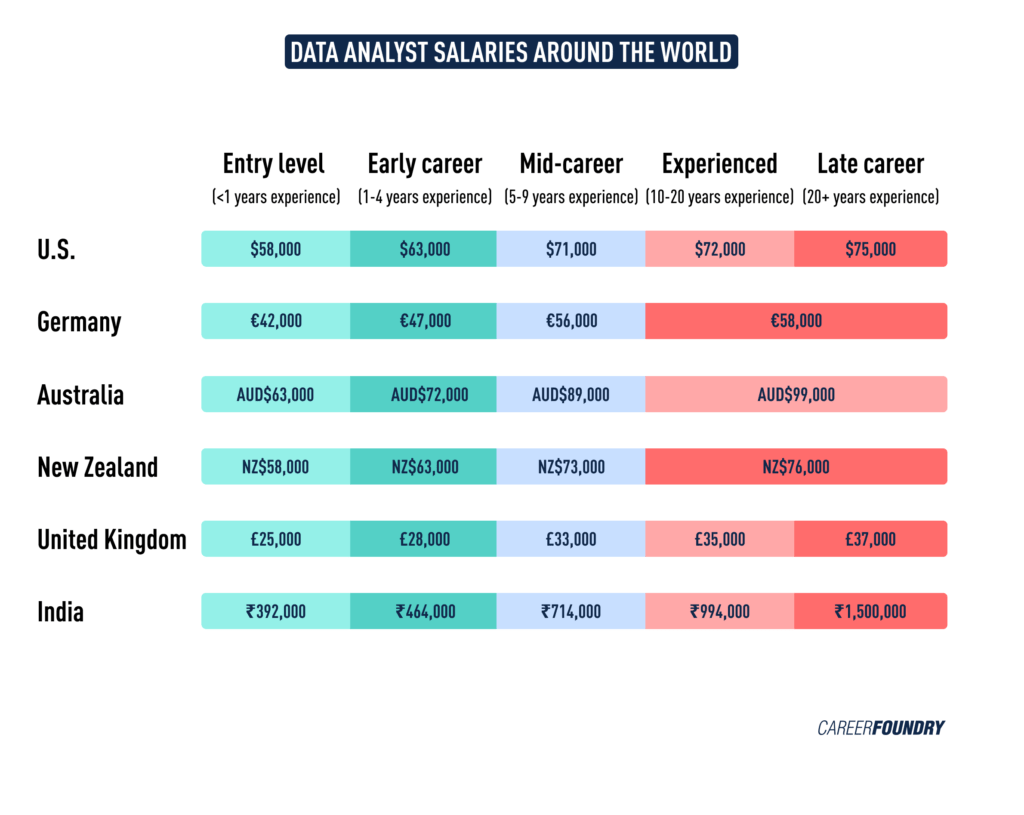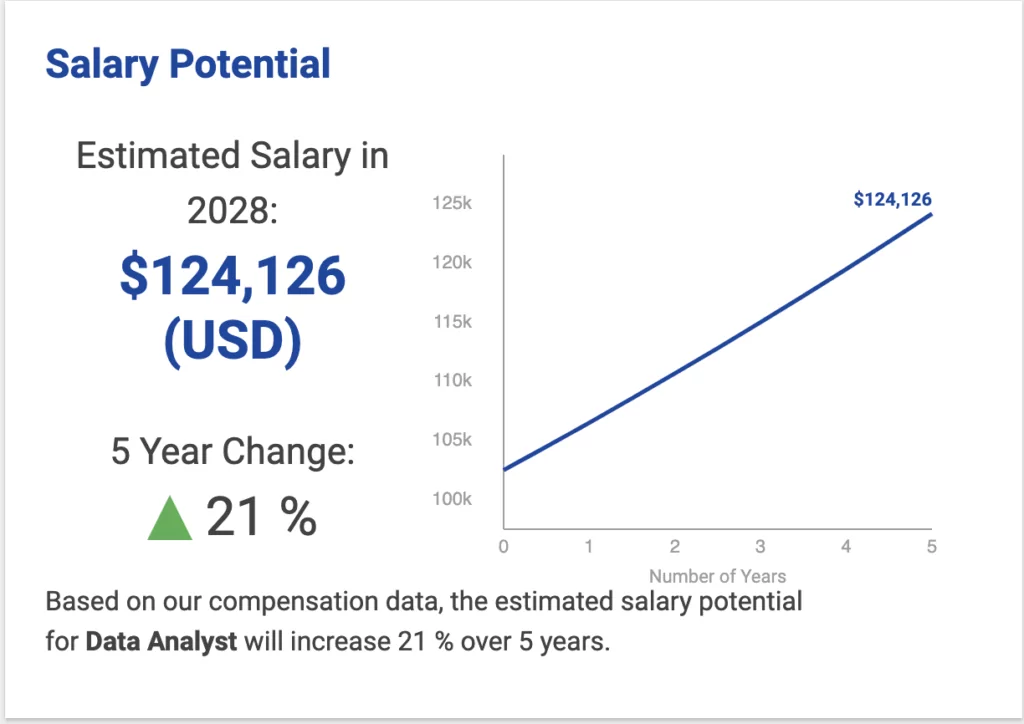How much can you earn on an entry-level data analyst salary in 2025? We’ve compiled all the latest data in this guide.
If you’re thinking about a career in data analytics, you’ll want to know what kind of salary to expect. And, if you’re a junior data analyst applying for your first role, you’ll also want to know where to place your salary expectations.
In this post, we’ve pulled together the latest entry-level data analyst salary data from multiple salary comparison websites—giving you a solid overview of how much you can expect to earn in the early years of your career.
Here’s what we’ll cover:
- What’s the average entry-level data analyst salary? (Updated for 2025)
- Entry-level data analyst salary based on location
- Entry-level data analyst salary based on job title
- Average data analyst salary based on experience
- Entry-level data analyst salary based on industry/company
- How do I increase my earning potential and employability?
- Summary and further reading
- Entry-level data analyst salary FAQ
Note: We’ll refer to U.S. dollars throughout—except for when we’re looking at international salaries, of course. Additionally: although we’ll be as consistent as possible, we’ll have to use different salary comparison sites, depending on the data they have available.
Don’t worry, though, we’ll link each salary to the relevant site so that you can get an up-to-date figure, based on real-time data.
Want to try your hand at data analytics before you commit? Check out this free data analytics short course.
1. What’s the average entry-level data analyst salary? (Updated for 2025)
Naturally, there is no single concrete answer to this question. However, we can put the average entry-level data analyst salary somewhere in the region of $65,491 in the United States.
How did we arrive at this figure? We took an average of different salaries to provide a more accurate feel for how much you might be able to earn.
As you can see, according to the following salary comparison websites, the figures are fairly broad:
- Glassdoor: $56,000
- SimplyHired: $52,000
- Payscale: $61,785
- Salary.com: $71,401
- Indeed: $77,311
- Salary Expert: $74,453
The variation here highlights just how tricky it is to pin down a single figure for the average entry-level data analyst salary based on job title alone. Factors such as your location and the industry you’re working in will also affect the figure.
However, even taking into account the potential margin of error, $73,000 is certainly nothing to sniff at!
That said, how much you earn varies depending on which state and which metropolitan area you’ll be working in. In New York City, for example, you’ll find a range of opportunities and industries, so we’ve created a dedicated NYC data analyst salary guide for you, as well as one for Los Angeles on the other coast.
As mentioned, however, several other factors contribute to how much you can earn in real-world terms. Let’s explore some of these now.
2. Entry-level data analyst salary based on location
One reason many people choose to train in data analytics is that the skill has such strong international currency.
As big data becomes even bigger business, companies, and organizations around the globe are seeking competent analysts who can provide them with trustworthy, data-driven insights. What’s more, data analytics jobs can often be done remotely, making the role a bit of a globetrotter’s dream.
In this section, we’ve listed the average entry-level data analyst salary for a handful of countries around the world. This time, we’ve taken data from SalaryExpert. SalaryExpert provides higher than average estimates, so do be sure to keep that in mind.
While the exact salaries naturally vary based on the specific job, the approximate spread is pretty much on the mark. So let’s take a look:
- Germany: $70,980 (65.110 €)
- United States: $73,820
- Australia: $91,460 ($140,541 AUD)
- United Kingdom: $44,970 (£55,959)
- New Zealand: $74,453 (NZ$125,415)
- United Arab Emirates: $75,080 (AED 275,834)
- South Africa: $29,000 (R556,635)
- India: $22,500 (₹1,855,150)
If you’re planning to relocate, make sure you research the average entry-level data analyst salary based on different job titles, too. Not to add to the confusion, but not all data analysts are necessarily called data analysts! We’ll cover this in the next section.

3. Entry-level data analyst salary based on job title
As data analytics skills become more ingrained in the digital economy, they evolve into different areas of business—meaning that data analytics is now becoming integral to many different job roles.
What does this mean for you? Well, in a nutshell, while you’ll still find the job title ‘data analyst’ commonly used on job sites, in many cases, data analytics is becoming more of a core skill than a standalone job position.
Here, we’ll compare baseline entry-level salaries for different job roles that require data analytics skills. It’s not an exhaustive list, but it should give you a taste of the differences.
The reason why these salaries vary so much is that they require additional skills and knowledge of a particular sector or business area. So, try to keep this in mind when you’re searching for a job—even if you’re completely new to data analytics, any previous experience you have in a sector should increase your earning potential for data analyst roles.
The following data comes from Payscale:
- Entry-level healthcare consultant salary: $73,614
- Entry-level business intelligence (BI) analyst salary: $63,676
- Entry-level marketing analyst salary: $55,791
- Entry-level systems analyst salary: $59,522
- Entry-level data engineer salary: $92,513
- Entry-level operations analyst salary: $56,533
- Entry-level machine learning engineer salary: $96,946
As we can see, the spread here is pretty broad. It’s also worth mentioning that for jobs like data or machine learning engineering, “entry-level” usually implies that you’re new to the role, but that you’ll have previously held some kind of data-related position before—that’s why they pay more!
4. Average data analyst salary based on experience
Salaries for data analyst jobs at all levels reflect the specific skills and aptitudes required for the roles. Most entry-level jobs in the field of data analytics command a healthy starting salary.
To give an example of what a data analyst can expect to earn depending on experience, Payscale gives a good indication of estimated salaries across the board.
Data analyst salary based on experience in the U.S.
Early career (1-4 years experience): $65,400
Mid-career (5-9 years experience): $73,424
Experienced (10-20 years experience): $74,329
Late career (20+ years experience): $77,085
Data analyst salary based on experience in Germany
Entry level (<1 years experience): €43,152
Early career (1-4 years experience): €48,471
Mid-career (5-9 years experience): €56,832
Late career (20+ years experience): €58,000
Data analyst salary based on experience in Australia
Entry level (<1 years experience): AUD$65,000
Early career (1-4 years experience): AUD$72,000
Mid-career (5-9 years experience): AUD$89,000
Experienced (10-20 years experience): AUD$99,000
Data analyst salary based on experience in New Zealand
Entry level (<1 years experience): NZ$58,000
Early career (1-4 years experience): NZ$63,000
Mid-career (5-9 years experience): NZ$73,000
Late career (20+ years experience): NZ$76,000
Data analyst salary based on experience in United Kingdom
Entry level (<1 years experience): £25,000
Early career (1-4 years experience): £29,000
Mid-career (5-9 years experience): £33,000
Experienced (10-20 years experience): £35,000
Late career (20+ years experience): £37,000
Data analyst salary based on experience in India
Entry level (<1 years experience): ₹400,000
Early career (1-4 years experience): ₹489,000
Mid-career (5-9 years experience): ₹764,000
Experienced (10-20 years experience): ₹1,017,000
Late career (20+ years experience): ₹1,500,000

It’s important to acknowledge a certain level of fluidity with data analyst salaries, and those with more specific skillsets or a more in-depth understanding of programming languages can expect to receive a boost in their salary.
According to Payscale, those possessing working experience with the tool Tableau can expect to earn 8% more than those without. Similarly, knowing how to use the programming language SQL can result in a 5% salary boost.
5. Entry-level data analyst salary based on industry/company
Finally, the company and industry that you’re working in will impact how much you can earn.
The beauty of being a data analyst is that such roles can be found in almost any industry. Most businesses make decisions based on their data, and they’ll need a data analyst to be able to do this.
In this section, we’ve pulled together a list of entry-level salaries from some popular firms in two of the sectors where data analysts are most in-demand right now: big tech and accounting.
Entry-level data analyst salaries in big tech
Data analysts play an important role in big tech.
At any of the following firms, an entry-level data analyst will usually be involved in creating dashboards to visualize the complex streams of data that these online companies constantly collect.
They’ll also be involved with building data storage, and improving products and services.
Entry-level data analyst salaries in finance and accounting
Anyone looking to launch their data analytics career and make a decent salary at the same time won’t go wrong with pursuing one of the “big four” accounting firms.
Data analysts in accounting use their skills for things like risk management, and identifying process improvements that make businesses more efficient. They’re also a great launching pad if you want to take your career in a different direction later on.
6. How do I increase my earning potential and employability?
Data analysts typically have an aptitude for numbers and statistics. Those who have completed mathematics or engineering-related degrees at university are certainly equipped with the kind of tools required for data analyst roles.
Learn new skills
Skills such as data modeling, data mining, and segmentation are all put to good use in the world of data analytics.
Experience organizing and analyzing large amounts of information are what employers are looking for, along with the communication skills required to present the findings of such work.
Add more tools to your toolbelt
You’ll be expected to know programming languages including SQL, data visualisation tools such as Tableau, and platforms including Sharepoint.
Working knowledge of Python and R, popular programming languages with data analysts and data scientists, is going to increase your employability significantly.
Having a decent command of some of the AI data analysis tools that rose to prominence in 2023 will also really help your resume stand out and increase your pay packet.
Consider a specialization
In case you haven’t realised by now, data is a broad, sprawling field, that’s constantly evolving. While this might seem overwhelming at first, it’s actually a major benefit for increasing your data analyst salary.
As you move along the data career path, pick an area which you’re interested in, that also has room for development, as well as healthy average salaries. As you start to build your skills and experience in that area, network with other analysts and experts in that sphere, and build more credibility yourself.
Before too long, you’ll be known as one of the go-to specialists in this niche, and with that (if that’s the right field) comes demand for your expertise.
Get a certification
It doesn’t matter whether it’s new soft skills, a new data analytics tool, or a course you completed in a related topic area to deepen your knowledge of the subject—get certified!
Having a certificate from a recognized provider not only reassures you before taking the training that it’s up to industry standards. They also let potential employers going over your resume (and current ones too) know at a glance that your knowledge in that area is up to a certain level. This allows you to increase your salary ask too!
7. Summary and further reading
So there you have it! A full range of entry-level data analyst salaries.
As we’ve learned, numerous factors contribute to how much you can earn. This includes where in the world you’re working, the job title itself, and—of course—the industry and the company that you’re working for.
As long as you have the appropriate data analytics skills under your belt, then you’ll be on the fast track to a great salary!
To learn more about a possible career in data analytics, be sure to check out this free, 5-day introductory data short course. You can also read the following introductory articles:
- What’s It Actually Like To Be A Data Analyst?
- What is Data Analytics? A Complete Guide for Beginners
- How to Build a Data Analytics Portfolio
- What’s The Difference Between A Data Scientist And A Data Analyst?
8. Data analyst salary FAQ
Now that we’ve covered everything you could possibly need, let’s go through some commonly-asked questions:
What is the lowest data analyst salary?
Based on the latest data available, the lowest data analyst salary sits around $52,000. However, other sources put the average entry-level data analyst salary around the $65,000 mark. Consult multiple sources when benchmarking your salary expectations.
What is the salary expectation for an entry-level data analyst?
Entry-level data analysts can expect to earn between $52,000 and $78,000 in the United States. Salary expectations should be based on multiple factors including location, industry or sector, job title, years of experience, and any specialist skills.
Do data analysts make good money?

SalaryExpert has used average salary data gathered throughout the years to predict that the earning potential for data analysts entering the industry will increase by 21% over the five years through to 2028.
This means from 2023 to 2028, the average base salary for a mid-level data analyst will increase from $102,416 to $124,126.
Is data analytics a good career path?
Many data analysts report having a great work-life balance, according to Huffpost. As a growing field, to put it simply: there are more open roles for data analysts then there are people to fill them! So even if you’ve just finished a certification, it’s likely you’ll be able to find a fulfilling career in the field.
Is data analyst a stressful job?
The answer to this question will largely depend on the culture of the company you end up joining. Organizations that do not prioritise a healthy work-life balance, paid time off, or other perks will likely seem more stressful than those that do.
What does a data analyst do?
Data analysts turn raw data into meaningful insights. Following the data analysis process, data analysts solve specific problems or answer certain questions for the business they work for based on data and the insights it provides.
Data analysts take these insights and share them with key stakeholders and decision makers, who can take action or plan for the future accordingly. Data analysts may also be responsible for overseeing the overall processes for collecting and storing data, as well as setting guidelines for data quality.
You can learn more about what data analysts do in this complete guide.
Do I need a degree to become a data analyst?
Absolutely not! While it certainly doesn’t hurt to have a Bachelor’s or Master’s degree under your proverbial belt, many people looking to make a career change are not looking to prolong their job search with a multi-year-long program. These days, other types of data analytics certifications are becoming more common.
Can you make 100k as a data analyst?
The numbers don’t lie: You certainly can earn 100k as a data analyst—sometimes even more! While you’re unlikely to earn a six-figure salary in your very first data role, it’s definitely an achievable goal as you work your way through your career.
Is a data analyst job worth it?
Yes, a data analyst job is worth it, especially in terms of industry demand. Data analysis is a skill that has been and continues to be in demand as our society becomes ever-more reliant on data to provide insights into the past, present and future. Because of this, those who possess the skills required to work as a data analyst will never find themselves short of work, no matter the industry!
How else can I increase my data analyst salary?
Keep on learning! Stay up-to-date on what’s going on in the industry by reading data analytics blogs, networking with others working in the industry, and upskilling.
Related reading: What are the highest paying data analyst jobs?
Can I be a data analyst without a degree?
You can absolutely become a data analyst without a degree! It’s becoming more common to career change into data analytics by taking an online course, which enables you to learn on your own terms, and in your own time. Make sure that the course you land on is certified to ensure its quality—not all courses will be recognized by recruiters.
